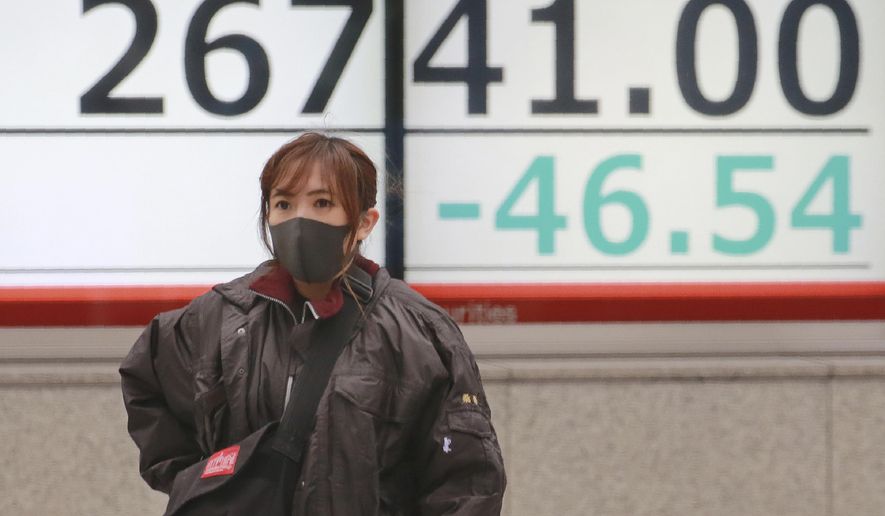Shares were mostly higher in Asia on Thursday, helped by progress toward rolling out coronavirus vaccines and talk of reaching a compromise on new help for the U.S. economy.
Shares rose in Hong Kong, Tokyo, Seoul and Sydney but fell in Shanghai.
The rollout of a vaccine in the U.S. could begin this month, if regulators give their approval. Drugmakers Pfizer and BioNTech said they won permission for emergency use of their COVID-19 vaccine in Britain, which will be one of the first countries to begin vaccinating its population against the virus.
The vaccine is the world’s first coronavirus shot that’s backed by rigorous science and a major step toward eventually ending the pandemic and helping economies return to normal.
“The vaccine has been the big prize for risk markets,” Stephen Innes of Axi said in a commentary. Vaccinations will reduce virus counts, resulting in a “collective demand lift for the world economy, and global geopolitical risk has also diminished after the U.S. presidential election. A much clearer view across the valley to economic recovery should mean more upside,” he said.
Hong Kong’s Hang Seng edged 0.2% higher to 26,582.85 and the Nikkei 225 in Tokyo was almost unchanged at 26,806.37. South Korea’s Kospi added 0.2% to 2,680.58 and the S&P/ASX 200 in Australia picked up 0.4%, to 6,613.60.
The Shanghai Composite index shed 0.5% to 3,432.47.
Overnight, the S&P 500 index rose 0.2% to an all-time high of 3,669.01, a second straight record close. It spend much of the day drifting between small gains and losses. A pullback in technology stocks and companies that rely on consumer spending kept the gains in check.
Treasury yields continued to head mostly higher, a sign of growing confidence in the economic outlook. Investors were not deterred by new data Wednesday showing that hiring by U.S. companies slowed last month. Nor by a report showing economic activity slowed in Novembe r as coronavirus cases surged.
The S&P 500 is now up about 13.6% for the year. The Dow Jones Industrial Average gained 0.2% on Wednesday, to 29,883.79. The tech-heavy Nasdaq composite, which also opened the month with a new record, slipped 0.1% to 12,349.37.
Optimism about vaccine developments have tempered lingering concerns over rising virus cases in the U.S., though worries persist about the economic fallout from new government restrictions on businesses aimed at limiting the spread.
Unemployment remains high as the COVID-19 outbreak widens the gulf between average people and the wealthiest Americans. Payroll processor ADP said Wednesday that its latest survey of private U.S. employers shows they added 307,000 jobs last month. That fell short of Wall Street analysts’ expectations for a gain of 405,000 jobs, according to FactSet.
The report precedes a broader jobs survey from the Labor Department due out Friday. Economists are forecasting that will show employers added about 441,000 jobs in November, down from a gain of 638,000 in October.
Traders are hoping Democrats and Republicans may reach a deal on some amount of economic stimulus for the economy before 2021, though they remain divided on the details and the cost.
On Wednesday, Federal Reserve Chairman Jerome Powell and Treasury Secretary Steven Mnuchin told lawmakers during a House Financial Services Committee hearing that Congress needs to approve COVID-19 relief funds without further delay.
Salesforce.com was the biggest decliner in the S&P 500, tumbling 8.5% after announcing a deal late Tuesday to buy messaging platform Slack for $27.7 billion. Microsoft slipped 0.4%.
Lyft climbed 9.6% after the ride-hailing company posted a smaller loss this quarter and better margins. The news helped boost rival Uber Technologies up 7%.
Treasury yields headed higher, giving banks a boost because they allow them to charge more lucrative interest rates on loans. The yield on the 10-year Treasury rose to 0.96% from 0.92% late Tuesday. It was steady at 0.94% on Thursday.
In other trading, U.S. benchmark crude oil lost 17 cents to $45.11 per barrel in electronic trading on the New York Mercantile Exchange. It gained 73 cents to $45.28 per barrel on Wednesday.
Brent crude, the international standard, gave up 14 cents to $48.11 per barrel.
The U.S. dollar bought 104.46 Japanese yen, up from 104.43 yen late Wednesday. The euro rose to $1.2116 from $1.2113.




Please read our comment policy before commenting.